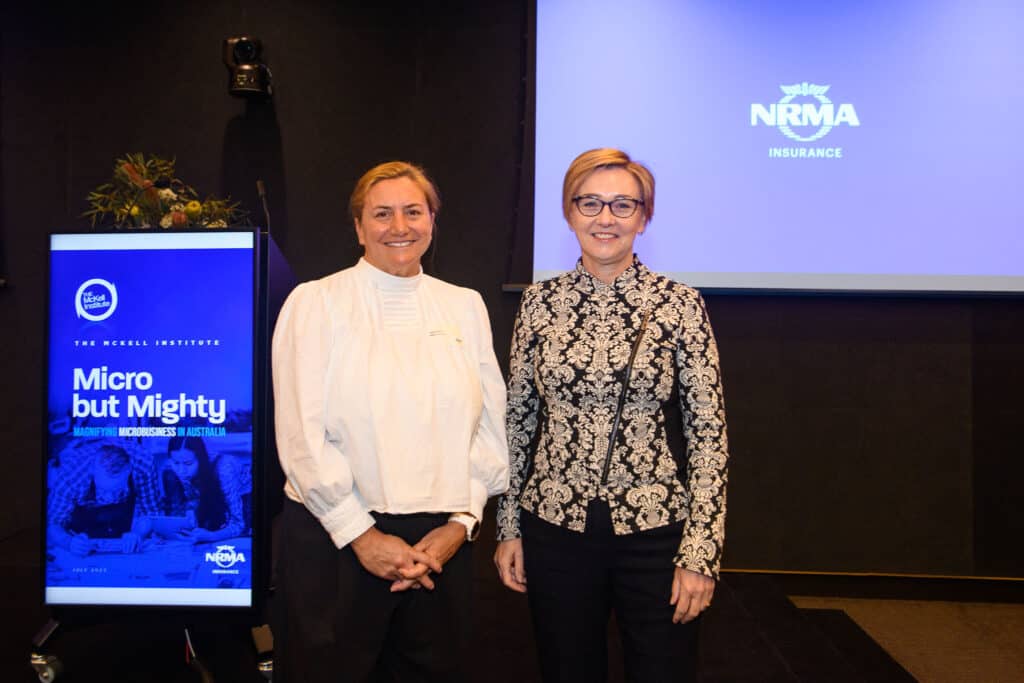
McKell Institute CEO Ed Cavanough, NRMA Insurance CEO Julie Batch, NSW Minister for Women the Hone Jodie Harrison, Mums & Co Founder and Managing Director Carrie Kwan, IAG Executive General Manager Corporate Affairs Jane Anderson. Source: Women's Agenda
Microbusinesses make up 89% of all businesses to form the backbone of the Australian economy – and it’s women business owners who are making up much of the growing sector.
The microbusiness sector has increased by 14% over the past four years, growing from 2 million to 2.28 million, with the contribution of microbusiness now exceeding that of small businesses in Australia.
The stats are revealed in a new report, written by the McKell Institute and commissioned by NRMA Insurance, highlighting the significant role women play in the microbusiness sector, and featuring case studies of women microbusiness owners, provided by Mums & Co.
According to the report, the number of businesses owned by women has increased from 31% in the early 2000s to over 35% in 2022. The report also challenges the stereotype that most microbusinesses are owned by men operating in trades.
NSW Minister for Women, Jodie Harrison, launched the report at NSW parliament on Monday morning, acknowledging the significant number of women leading the way in the microbusiness sector, and noting some of the unique challenges they are facing.
“Women play an essential role in the Australian business community and we are committed to supporting more of them into entrepreneurial pathways,” Harrison said.
“The microbusiness sector is particularly advantageous for women, providing them with flexibility and opportunities that the more traditional labour market might not.”

NRMA Insurance CEO Julie Batch and NSW Minister for Women the Hone Jodie Harrison. Image: Supplied.
Gender gaps in employment conditions, as well as the disproportionate allocation of caring responsibilities, are cited as key reasons so many women in Australia have started their own microbusiness. The lower entry barriers to starting a microbusiness is also a key draw card for women.
The report acknowledges a “sandwich generation” of women who are tasked with caring for both their children and their ageing parents, and notes how the flexibility offered by business ownership can be attractive to women.
So what are the recommendations?
Currently, there are various ways a “microbusiness” can be defined, with the ABS and the Australian Tax Office each having different definitions. One of the key recommendations made in the report is for a standardised definition of microbusiness to be established and used across Australia.
Another key recommendation is to address the structural barriers which limit access to finance for women who own microbusinesses.
One of the key concerns raised in the report is the range of disadvantages female microbusiness owners face when attempting to access finance. Setting up stricter monitoring of gendered lending practices, and providing government-backed loans to women business owners could be part of the solution.
The ongoing threat of extreme weather and cybersecurity risks related to operating online businesses were also key concerns mentioned in the report.
In related news, IAG, the parent company of NRMA Insurance, has announced its acquisition of Mums & Co.
“The acquisition of Mums & Co was a natural progression for our business, and we are thrilled to continue to support the platform that helps women and their supporters scale their business. We also help business owners manage their risks by offering insurance options,” Julie Batch, NRMA Insurance Chief Executive Officer, said of the acquisition.
This article was first published by Women’s Agenda.
Handpicked for you

It’s about damn time: 13 Aussie VCs to disclose women-led funding data


COMMENTS
SmartCompany is committed to hosting lively discussions. Help us keep the conversation useful, interesting and welcoming. We aim to publish comments quickly in the interest of promoting robust conversation, but we’re a small team and we deploy filters to protect against legal risk. Occasionally your comment may be held up while it is being reviewed, but we’re working as fast as we can to keep the conversation rolling.
The SmartCompany comment section is members-only content. Please subscribe to leave a comment.
The SmartCompany comment section is members-only content. Please login to leave a comment.